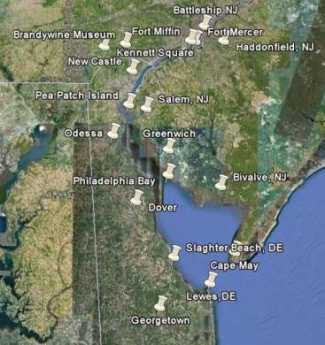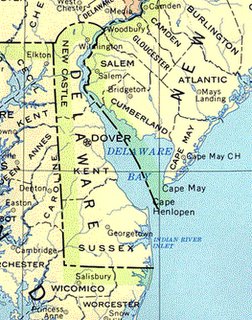Related Topics
Delaware (State of)
 Originally the "lower counties" of Pennsylvania, and thus one of three Quaker colonies founded by William Penn, Delaware has developed its own set of traditions and history.
Originally the "lower counties" of Pennsylvania, and thus one of three Quaker colonies founded by William Penn, Delaware has developed its own set of traditions and history.
Land Tour Around Delaware Bay
 Start in Philadelphia, take two days to tour around Delaware Bay. Down the New Jersey side to Cape May, ferry over to Lewes, tour up to Dover and New Castle, visit Winterthur, Longwood Gardens, Brandywine Battlefield and art museum, then back to Philadelphia. Try it!
Start in Philadelphia, take two days to tour around Delaware Bay. Down the New Jersey side to Cape May, ferry over to Lewes, tour up to Dover and New Castle, visit Winterthur, Longwood Gardens, Brandywine Battlefield and art museum, then back to Philadelphia. Try it!
Delaware Declares Independence ... From Pennsylvania

|
| Delaware Map |
To bewilder your friends from the State of Delaware, just ask them when and why Delaware broke off from Pennsylvania; chances are they haven't the foggiest answer. But they will recognize it is a legitimate question. Everyone does know that Delaware was once owned by William Penn and was part of Pennsylvania. It was generally referred to as the three Lower Counties. But what happened then doesn't seem to be taught very effectively in the Delaware schools, and not much is written about it.
Not much is written because not much happened. No revolutions, bombings, hangings or even acrimonious debate; just think how much Serbia, Russia, China, Sudan and a lot of other countries have to learn about self-determination, from Delaware.
The history of Delaware up to 1674 was of Dutch, Swedish and even some Finnish settlement and arguments; doesn't count. The Duke of York (later James II) owned it and seems brief to have toyed with combining it with New York; that's how Delaware happens once to have been called the South River, and the Hudson the North River. But William Penn acquired it in 1682, mostly with the motive of having unchallenged access to the ocean from Pennsylvania. Apparently, the people who lived away from the river felt more kinship with Maryland, and expressed unwillingness to be linked with some religious experiment in Philadelphia, especially if they had to travel there to settle their affairs. There is not much Catholicism in Delaware at present, but that seems to have been part of the uneasiness in 1701. So Penn granted them quasi-autonomy and their own separate assembly, which resulted in a peaceful enough arrangement until the American Revolution. Penn got all he wanted, which was to sell off the land and maintain a clear river passage, and by the time of the Revolution, his descendants had lost all control of things. The control of Pennsylvania over its three lower counties had never been terribly firm, and during the eight-year Revolutionary chaos, it sort of drifted away. When its votes were needed for the Declaration of Independence and later for the Constitution, it was expedient to recognize Delaware's claims.
That's perhaps all there is to this vague story of statehood building, except for one nagging doubt. Delaware was a plantation state and a slave state. It's sided with the North during the Civil War, but it remained a slave state. It voted against Lincoln's Emancipation overtures, and refused to ratify the Thirteenth, Fourteenth and Fifteenth Amendments until 1901. Until the Lewes-Cape May ferries got busy with Garden State Parkway traffic, lower Delaware's population was almost exclusively either African-American or many-generation English descendants. The hospitals had white-only and black-only restrooms until the Second World War. Nothing better illustrates that the Civil War was primarily fought to defend the Union, rather than to eliminate slavery, than the tangled local history of the border states, of which Delaware was definitely one.
And so, you have to wonder. Is it possible that the residents of the Lower Counties in 1776, especially in the southern portion where John Dickinson had a plantation, could recognize that the Quakers of Pennsylvania were relentlessly moving in a direction which surely would eventually conflict with the slave system? Maybe, looking ahead, the chaos of Revolutionary times provided a plausible moment to make a clean separation. These are awkward questions to ask, perhaps best passed by, in silence.
Originally published: Friday, June 23, 2006; most-recently modified: Thursday, May 16, 2019
| Posted by: Joseph N. DiStefanoj | Feb 18, 2018 11:38 PM |
| Posted by: Joseph N. DiStefanoj | Feb 18, 2018 11:38 PM |
| Posted by: Joseph N. DiStefanoj | Feb 18, 2018 11:28 PM |
| Posted by: Larry | Jan 16, 2015 8:45 PM |
| Posted by: rpm | Aug 13, 2012 6:19 PM |